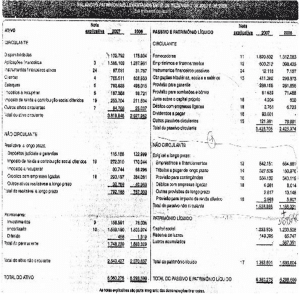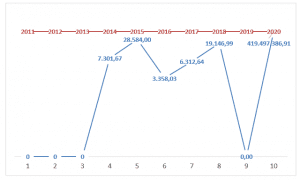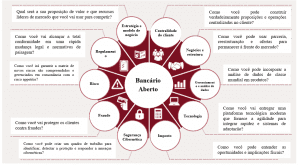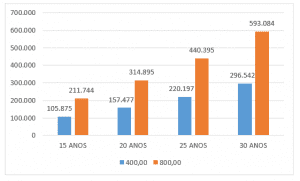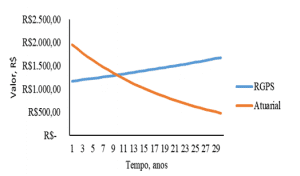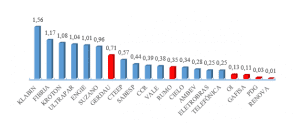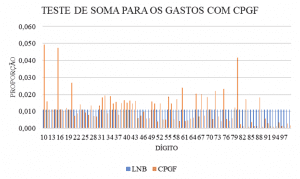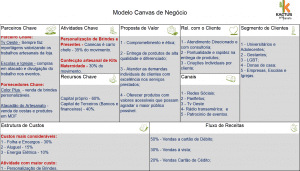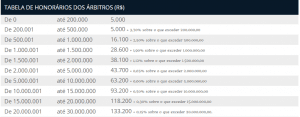ORIGINAL ARTICLE
HACKBARTH, Iara Carla Nonato Souza [1]
HACKBAHTH, Iara Carla Nonato Souza. The accounting professional and the new technologies. Revista Científica Multidisciplinar Núcleo do Conhecimento. Year 05, Ed. 11, Vol. 07, pp. 98-103. November 2020. ISSN: 2448-0959, Access link: https://www.nucleodoconhecimento.com.br/accounting/new-technologies
SUMMARY
Technological advances have been one of the factors influencing how organizations will invest their assets and plot their strategic planning. In this sense, accounting professionals to be in a strategic position supporting the plans of these organizations, must follow the technological advances that directly influence organizations in the financial and accounting sphere, and indirectly, technologies that affect all levels of organizations. The research aims to make a study on the performance of the accounting professional in the face of new technologies and their performance in the generation of information for decision making. The research was exploratory and descriptive, and data collection was through secondary sources, involving academic papers published in national journals, theses and dissertations. As for the results of the research, all were achieved, reaching the conclusion that the accounting professional has an important role in the context and that it must be updated with new technologies so that they can provide more secure and reliable information to the companies’ board, assisting them in the decision-making process.
Keywords: Professional accounting, challenges of the profession, technologies.
1. INTRODUCTION
Faced with the new scenario shaped by foreign capital companies, Brazil has experienced the accelerated advance of new technologies, which makes it essential for national companies to seek more quality of their productivity making them more competitive in the foreign market. These technological advances directly influence accounting professionals who are aware of the new market demands, being some of the professionals who most use these technologies, which puts them in a position of constant search for updating, making professionals essential within organizations.
The challenge is increasing for accounting professionals who need to improve the technical capacity of the constant updating and only then will they be able to succeed in the performance of their activities. The challenge is to be connected with all the changes inherent to the processes of daily life, as well as in world information technology taking into account the Internationalization of Accounting Rules is not enough to update at the level of Brazil but the world which provides new trends for professionals in the area.
2. THE PURPOSE OF ACCOUNTING
According to Iudícibus (2000, p. 22), Accounting aims to control phenomena that occur in the assets of a given entity, through records, classification, exhibition demonstration, analysis and interpretation of the facts that occurred in these places, “aiming to provide information and guidance necessary to make decisions about its composition and variations, as well as on the economic result arising from the management of wealth of assets”.
Currently, in addition to the main purposes of Accounting, much more is required of professionals, because these professionals need to be extremely technological having sufficient capacity and skills to solve problems, propose solutions and be a holder of knowledge of technologies and their impacts within organizations.
3. THE NEW PROFILE OF THE ACCOUNTING PROFESSIONAL
Brazil is the eighth economy in the world an important position in the international ranking but in addition to its economic position we have another theme equally important for accounting professionals the IFRS (International Financial Reporting Standards) which means a set of international accounting standards reviewed and issued by the International Accounting Standards Board IASB ( Council of International Accounting Standards) this scenario in which accounting professionals are inserted face the great challenge perhaps the greatest of all , know its importance in economic and social scenarios besides being aware that they can never fail to seek renewal, training and, why not become a scientist to overcome market challenges.
The accounting professional needs to be seen as a communicator of information essential to decision making, because the ability to evaluate past facts, perceive the present and predict future events can be understood as a preponderant factor to business success. (SILVA, 2003, p. 3)
It is no longer up to the old-fashioned view of the accountant an indirect government employee, whose main activity was to calculate taxes and fill out guides and forms to meet the tax man. In this context, the accounting professional should show that his role has become even more important in economic and social aspects, although computerization and automation have replaced the human being in some aspects, being able to interpret the numbers and make decisions at all times in favor of the requirement by the heritage scientist, with scientific knowledge required by a professional committed to his craft.
4. INFORMATION TECHNOLOGY IN ACCOUNTING
The advantages of being able to count on the technological advances that evolve at all times are countless, but the main thing for Accounting is undoubtedly the possibility of generating information in an extremely short time and with minimal margin of error.
Managers are increasingly focused on providing quality information in a short period of time ensuring decision-making effectively, which leads IT professionals to improve the mechanisms and processes to suit the needs of each business follow-up. Cruz (1998, p. 20) thus conceptualizes: “Information Technology is any device that has the capacity to treat data and/or information, both in a systemic and sporadic way, whether it is applied in the product or in the process”.
Considering the author’s definition, it is worth mentioning that this tool represents competitiveness and a decisive influence, taking into account that it affects the way companies operate, operationalize their processes and compete with each other. In a definitive way the use of information technology is no longer a technical concern and became a strategic issue, being responsible for much of the success of organizations.
Not unlike the other business segments, Accounting needed a change in the means as it was executed; operationalizing its processes and updating itself technologically, so the accounting professional must be connected the updates with the existing technological resources in the market. One of the main if not the most important is ERP (Enterprise Resource Planning), which in Portuguese means; planning of the Company’s Resources, acting as an integrated management system. It can be understood that management software is a system that is attentive to all daily operations of a company, be they Billing, Balance Sheet, Purchase to Track Flow, Human Resources, Finance, Invoice generation, Tax Assessment to Personnel Administration, Inventory Inventory to Accounts Receivable, Employee Point to control of factory machinery , among other administrative and operational work carried out in a company.
5. FINAL CONSIDERATIONS
Accounting when acting in a consultative manner can be understood as a tool that helps in the resolution of management issues of the company, based on accounting results. This performance has been the differential for professionals in the area and advances in technology drive and make it possible to provide the business society with faster and more accurate information, leading companies to seek more effective solutions, enabling decision-making to be streamlined. In this article, we point out as one of the solutions the Integrated Management System (ERP), which allows analyzing the company as a cohesive system, full of interactions.
The change of the professional profile of the accountant, who was previously only the person responsible for the bookkeeping of the facts that change the assets of the companies to an effective manager with the role of assisting in decision making, can be facilitated with the implementation of integrated systems (ERPs), since the system will be responsible for the operational part of the records, while the Accounting professional for the analysis of them.
REFERENCES
ALBERTÃO, S. E. ERP-Sistemas de Gestão Empresarial: metodologia para avaliação, seleção e implantação para pequenas e médias empresas. São Paulo: Iglu, 2001.
CRUZ, T. Sistemas de Informações Gerenciais. São Paulo: Atlas, 1998.
________. Entenda o que é ERP (Sistemas de Gestão Empresarial). Portal ERP, 30/01/2012. Disponível em: https://portalerp.com/entenda-erp
CFC- Conselho Federal De Contabilidade, 03/10/2018. Disponível em: https://cfc.org.br/noticias/a-importancia-dos-normatizadores-nacionais-para-o-desenvolvimento-dos-ifrs/
IUDÍCIBUS, S. Teoria da contabilidade. 6. ed. São Paulo: Atlas, 2000.
SOUZA, E.; ASCENÇÃO, H.; SOUZA, I. Adequação Do Profissional De Contabilidade Junto As Novas Tecnologias Dos Sistemas Integrados De Informação. Brasil Escola. Available from: https://meuartigo.brasilescola.uol.com.br/informatica/adequacao-profissional-contabilidade-junto-as-novas-.htm
Ba[1]chelor of Accounting Sciences, Post Graduated in Controllership Finance and Compliance, Postgraduate in Leadership and Coaching, Postgraduate in Auditing, Accounting and Expertise.
Sent: June, 2020.
Approved: November, 2020.

